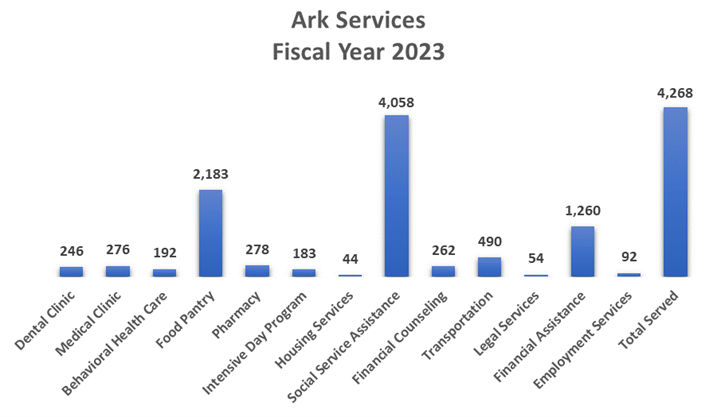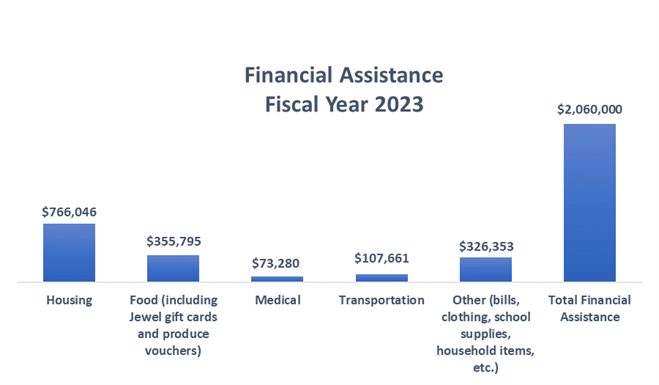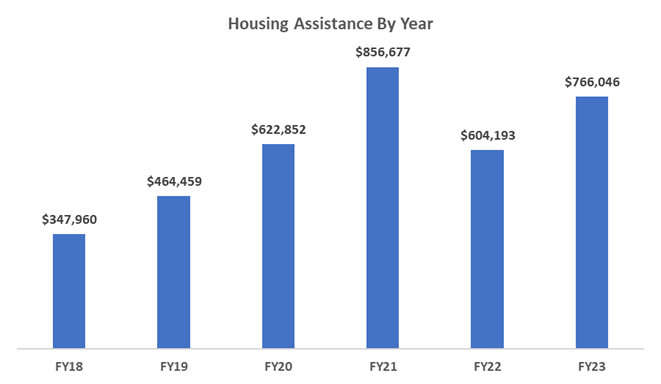Principles for Community Healthcare Report

I. Introduction and target audience
The Ark is a not-for-profit, community-funded health and human services agency with facilities on Chicago’s north side and in Northbrook. The Ark’s mission is to enhance the health and well-being of low-income families and individuals across the Chicagoland Jewish community and to help them achieve economic stability by providing a broad array of free services through a wraparound approach. Our comprehensive case management model recognizes that health is affected by a variety of social and economic factors, such as housing, education, food access, mental health, and more. The Ark employs a staff of 60 professionals and relies on more than 1,000 volunteers to serve over 4,200 clients each year. Services include health care (medical, dental, optometry, and pharmacy); a kosher food pantry; housing assistance and a homeless shelter; mental health services; employment counseling; financial counseling; spiritual enrichment; legal aid; and more. In 2011, we opened a second office in Northbrook to address poverty in Chicago’s suburbs where nearly half our clients live. The Ark provides more than $1.6 million in direct financial assistance to clients each year to address their urgent needs, and case managers work closely with clients to help them access The Ark’s wide array of services, as well as government benefits and programs at other agencies. The Ark’s services are designed to meet the unique needs of the local, low-income Jewish population in a culturally sensitive and appropriate way, but no one in need is turned away.
The Ark serves individuals of all ages and backgrounds in the greater Chicagoland Jewish community. Some families have lived here for generations, while others are recent immigrants. More than 90% of Ark clients have incomes under 200% of the Federal Poverty Level, and the average family of four struggles to live off less than $27,750 per year, in a region with one of the highest costs of living in the United States. More than 70% of Ark clients spend more than a third of their income on housing, and 50% rely on financial assistance for rent expenses and transportation. Geographically, 59% of Ark clients live in the City of Chicago, while 41% live in the suburbs (primarily north and northwest of Chicago). As far as education, 95% have completed high school, 37% have a college degree, and 13% have a graduate degree. One-third of Ark clients are employed full- or part-time but do not earn enough to cover their basic living expenses, and 72% of Ark clients are under the age of 65.
II. Promoting overall health in the community
The overall goal of our programs is to help clients in need achieve stability by providing support and services that they otherwise would not have access to, to help them navigate toward self-reliance. Over the past several years, we have worked closely with the evaluation team of the Jewish Federation of Metropolitan Chicago, and the CQI Community Group of the Children & Family Research Center of the University of Illinois’ School of Social Work, to expand and elevate our process of continuous quality improvement, assess the outcomes of our services, and measure success. We collect detailed data on every service and client interaction and analyze the data collected to determine the impact of our services. We also conduct periodic anonymous surveys, which help us gauge client satisfaction with our services and in turn inform planning.
The Ark addresses the needs of the low-income Jewish community in Chicago and the surrounding suburbs through a holistic, wrap-around approach. One of the greatest challenges the community currently faces is housing insecurity, particularly with the drastic rise in rent and housing costs in recent years. Over the past year, rents in many parts of Chicago and the suburbs have increased by 10-20% or more. Another challenge that The Ark’s clients continue to face is food insecurity, which has become a greater issue as the price of food continues to rise. Between 2021 and 2022, hunger among Chicago households rose from 13% to 16%, and in households with children from 18.5% to 22%. In 2022, grocery prices increased by 13.1%, which is the largest annual increase since 1979, according to Bureau of Labor Statistics data. While food prices are predicted to grow more slowly in 2023 and 2024, they are still at above-average historical rates. In addition to the increase in cost of food, the SNAP emergency allotments issued at the start of the pandemic returned to pre-pandemic levels in March 2023. SNAP participants saw a cut in their benefits from $55 to $255 per person per month, with the average one-person household losing $86 in benefits.
During the period between July 1, 2022, and June 30, 2023, The Ark served 4,268 individuals, including more than 1,000 new clients, over half of whom were referred by a family member or friend. The chart below shows the wide array of services our clients accessed through The Ark over this period. Some programs saw decreased participation last year, as expected in part due to the temporary relocation of Ark services. We expect to see numbers continue to trend upward in the coming year, especially as we move into our renovated and expanded home on California Avenue in the first quarter of 2024. To address the challenges some clients have had accessing our temporary Chicago location, The Ark has offered increased transportation assistance, as well as expanded home delivery options for food and medications. We also continued to supplement Food Pantry packages with Jewel gift cards for clients to be able to purchase items that may not be available at the Pantry, in part due to space constraints in the temporary location.

In addition to the services and programs that clients of The Ark have access to, The Ark also provides significant financial assistance for critical expenses such as housing, food, transportation, and medical bills. The following chart shows the amount of financial support distributed to clients during the fiscal year ending June 30, 2023.

Housing insecurity remains one of the greatest challenges that clients of The Ark currently face. With drastic rises in rent and housing costs over the past few years, clients have been facing increased financial stress as they struggle to remain in their homes or find affordable housing alternatives. In addition to the Sarnoff Levin Residence, The Ark’s homeless shelter, which provides critical emergency housing for clients facing homelessness, we have continued to see success from the New Beginnings program, which provides longer-term housing for clients, for up to a year, thanks to the generosity of a donor who has contributed the use of 7 apartment units on the north side of Chicago rent-free for Ark clients. The Ark also offers substantial financial assistance for rent, mortgage, and utility payments to help clients in crisis remain in their homes while case managers work with them to stabilize their circumstances. As demonstrated in the chart below, the growing need for housing-related financial assistance continues to trend well above pre-pandemic levels, even as it has declined modestly from the peak during the height of the pandemic.

III. Community partnerships promoting continuity of health care for high risk/underserved and disadvantaged populations
The Ark maintains close working relationships with other agencies both within and outside of the Jewish community. We solicit client referrals from JCFS, CJE and Holocaust Community Services, synagogues, schools, and hospitals. We partner with synagogues for our annual food drive to stock the Food Pantry. We actively partner with JUF in numerous ways and receive an annual allocation, in addition to specific grants for general and restricted purposes. We also work with other organizations on various projects. For example, this past winter we partnered with Temple Sholom for their Chanukah Box Project, which provided boxes of food and holiday supplies for over 60 low-income families. The Ark is also a member of the Greater Chicago Food Depository, from which we obtain produce and other limited food items. We provide food and other assistance for SHALVA clients who are experiencing domestic violence, dental treatment for clients of CJE’s Holocaust Community Services program, and refer clients to Maot Chitim and CJE for holiday food and delivered meals. We work with a wide array of other community organizations to refer clients for complementary services, and to ensure that we are fully meeting the needs of all the people we support.
IV. Community-oriented approach to program development
The Ark’s free services are designed to meet the varying needs of the community and provide wraparound support to help end the cycle of poverty for clients seeking assistance. The Ark launched a new Child and Family Wellness Program in the summer of 2022 to address the mental health crisis, exacerbated by the pandemic, that disproportionately impacts low-income children and their families. Through this program, teachers, administrators and, where present, school mental health staff, identify children with significant, unmet mental health needs, who are not receiving care primarily, or in large part, due to their family’s lack of resources. Once a child is referred to The Ark, a social worker evaluates their needs and refers the family to a private practitioner for psychotherapy and, where needed, family counseling, paid for by The Ark. The family is also provided with case management and the full scope of Ark services to alleviate financial and other challenges.
An essential goal of the program is to mitigate the impact of poverty on the mental health of children by providing case management and wraparound social services for the entire family, in addition to coordinating and funding psychotherapy and other critical interventions for children with identified mental health needs. A solid foundation of nutritious food, stable housing, and financial stability is crucial in fostering positive mental health and wellbeing for both children and their families, while mental health support helps mitigate the effects of living in poverty. Clients are assigned a case manager, who meets with them regularly to discuss their needs and refers them for appropriate services within and outside The Ark. Between July 1, 2022, and June 30, 2023, The Ark provided more than $183,000 in direct assistance for families with children participating in the Child and Family Wellness program. Financial assistance, which included more than $70,000 to cover the cost of psychotherapy for 60 children, was distributed to 50 households with 303 household members. Support also included food assistance, rent and utility assistance, and financial support for other urgent needs, such as transportation and school supplies, addressing the most urgent needs of each family unit. Through a new Mental Health Initiative, we have also begun providing free counseling to adult clients of The Ark, many of whom have significant unaddressed mental health challenges and very limited access to qualified therapists through Medicaid and other programs. Through this initiative, we will also provide training to clinical staff to increase The Ark’s internal capacity to address clients’ mental health needs in individual and group settings.
Founded in 1971, The Ark has provided services to the community for more than fifty years. Funding for our programs and services comes from a combination of individual donors, foundations, businesses, and organizations. We receive an annual allocation from the Jewish Federation of Metropolitan Chicago in addition to other endowment funds and grants through JUF. A small amount of our annual revenue also comes from government funding. We continuously seek out new community partnerships and connections to grow and sustain our support base. The Ark is also developing a new strategic plan, which we expect to finalize in the first quarter of 2024. This 3–5-year plan will ensure that we are aligning our resources in optimal ways and creating a sustainable model for decades to come. The Ark’s wraparound services and programs serve more than 4,000 clients each year: 72% of The Ark’s operating expenses go directly towards programs, and 55% of our revenue comes from private and public grants. The Dental Clinic budget total for the fiscal year ending June 30, 2024, is $247,846, which makes up 2.6% of The Ark’s total budget.